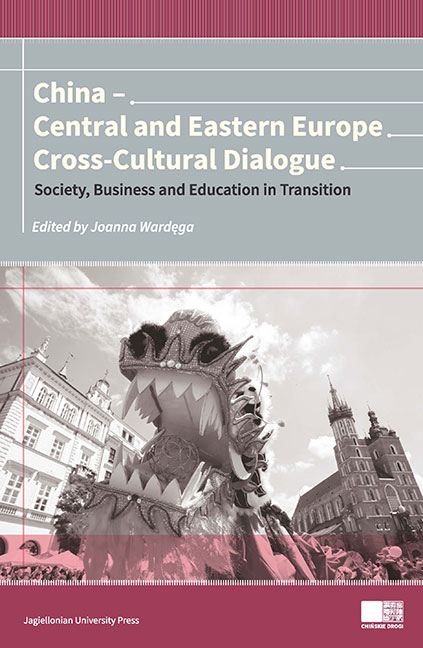Book contents
- Frontmatter
- Contents
- Foreword
- PART I Society and Culture in Transition
- PART TWO Economy and Markets in Transition
- PART THREE Education in Transition
- Opening the Two-Way Fast Lane for China-CEE Cultural Exchange by Equally Valuing the International Promotion of the Chinese Language and the CEE Languages Teaching
- A Contrastive Analysis of Traditional Chinese and Western Teaching Styles – A Case Study
- How Does Learning Style and Teaching Style Jointly Relate to Cultural Intelligence? A Study of Chinese Overseas Students
- Preparation of University Students from Western Cultures for Cooperation with China: Reasons and Methods
- Facing the Challenges of Teaching Chinese through Confucius Classrooms in Slovenian Schools: Current Situation and Prospects
- The Role of the Confucius Institute at Ss. Cyril and Methodius University in Skopje in Promoting the Chinese language, Culture and Business in the Republic of Macedonia
- Education in Transition of China-Based Jesuits from the Austrian Province
- Link in the History: The Development of the Research on Avguštin Hallerstein and its Contemporary Meaning
- Contributors
Link in the History: The Development of the Research on Avguštin Hallerstein and its Contemporary Meaning
from PART THREE - Education in Transition
Published online by Cambridge University Press: 22 December 2017
- Frontmatter
- Contents
- Foreword
- PART I Society and Culture in Transition
- PART TWO Economy and Markets in Transition
- PART THREE Education in Transition
- Opening the Two-Way Fast Lane for China-CEE Cultural Exchange by Equally Valuing the International Promotion of the Chinese Language and the CEE Languages Teaching
- A Contrastive Analysis of Traditional Chinese and Western Teaching Styles – A Case Study
- How Does Learning Style and Teaching Style Jointly Relate to Cultural Intelligence? A Study of Chinese Overseas Students
- Preparation of University Students from Western Cultures for Cooperation with China: Reasons and Methods
- Facing the Challenges of Teaching Chinese through Confucius Classrooms in Slovenian Schools: Current Situation and Prospects
- The Role of the Confucius Institute at Ss. Cyril and Methodius University in Skopje in Promoting the Chinese language, Culture and Business in the Republic of Macedonia
- Education in Transition of China-Based Jesuits from the Austrian Province
- Link in the History: The Development of the Research on Avguštin Hallerstein and its Contemporary Meaning
- Contributors
Summary
Since the end of the 16th century, Jesuits carried out a huge plan of taking a sea-voyage eastward. Missionaries from Eastern Europe started arriving in China accordingly. For example, from the early 17th century to the mid-18th century, statistics show that four Polish missionaries came into mainland China, amongst whom Jean M. Smogolenski and Michal Boym (Wardęga, 2010) were the most famous ones and both had the experience of studying theology in Krakow. Amongst other missionaries to China were also Karel Slavicek from Czech (Bohemia) Avguštin Hallerstein from Slovenia.They were the first Eastern Europeans getting to know China. In recent years, with the increasingly close communication between China and Europe, the research on Eastern European missionaries which concerns plenty of untapped materials and topics, begins to attract attention from academia. I attended a round table conference on Avguštin Hallerstein, held by Slovenian scholars at Ljubljana in 2006. From then on, I got myself involved with the historical character. Participating in a lot of activities in Europe or Beijing, I, to some extent, became a direct witness to the research plan on Avguštin Hallerstein. Therefore, I hope to take this opportunity to provide an academic overview to this important historical character. Since in contemporary academic context, as we can see, the Jesuits’ coming to China is not an issue free of controversy, this paper intends to give reflective consideration to the activities of early Jesuit missionaries including Avguštin Hallerstein in China, with reference to some new theoretical discourses.
A kind of Process: Retrospection on the Research of Avguštin Hallerstein
As an international project, the research on Avguštin Hallerstein was undertaken mainly by the scholars from Slovenia and China. Yan Zonglin, a scholar living in Republican China, was the first one paying attention to Avguštin Hallerstein. At the end of the 1930s (or in the beginning of 1940) he published a paper named The Document of Portuguese Envoy coming to China in the 18th Year of the Reign of Emperor Qianlong, which illustrated in detail, how Avguštin Hallerstein, a man from “热尔马尼亚人”, as a Portuguese envoy, had passed through customs in China (Yan, 2003, pp. 213–215).
- Type
- Chapter
- Information
- China - Central and Eastern Europe Cross-Cultural Dialogue Society, Business and Education in Transition , pp. 433 - 442Publisher: Jagiellonian University PressPrint publication year: 2016



